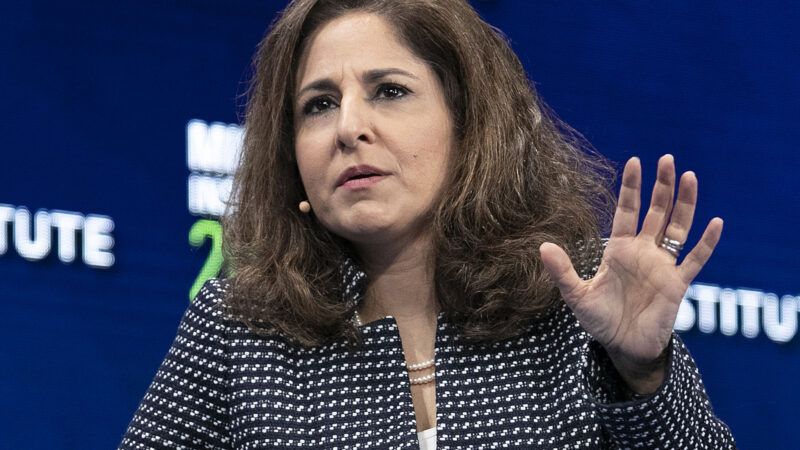Neera Tanden, Biden's Pick for Budget Office: Now Is Not the Time To 'Worry About Raising Deficits and Debt'
She once suggested that if Americans care about the deficit so much, maybe we should make Libya pay for it.

President-elect Joe Biden has tapped Neera Tanden, president of the Center for American Progress and a former advisor to Hillary Clinton, to head the U.S. Office of Management and Budget. The position requires Senate confirmation, which might be a long shot, given Tanden's long history of feuding with not just Republicans but also fellow Democrats.
If Tanden does take control of the OMB, then the office will be run by someone who has recently said that deficits and the debt should be no obstacle whatsoever to further government spending. At the start of the pandemic, she co-authored a commentary piece titled, "Deficit and Debt Shouldn't Factor Into Coronavirus Recession Response."
"Deficits and debt pose no comparable risk," wrote Tanden. "Policymakers should set aside their concerns about red ink and deliver the response the crisis demands."
Tanden has said that the purpose of the budget is to "expand opportunity for all Americans" and that excessive fretting about deficits hinders economic growth.
To the extent Tanden has expressed any concern for the debt at all, it was mostly tactical: She has previously worried that spending wildly without paying for it makes the government unpopular with voters. In 2011, she came up with a novel solution to this problem, suggesting in an email to other CAP staffers that "oil rich countries" in the Middle East should pay the U.S. back in exchange for our military presence. She was specifically thinking of Libya, which was in the middle of a civil war at the time, with the U.S. and NATO offering support to the rebel factions. Indeed, Tanden sent this email—which was later leaked to her critics, including Glenn Greenwald—just a day after Libyan leader Moammar Gadhafi was brutally killed by rebels.
"We have a giant deficit," wrote Tanden. "They have a lot of oil. Most Americans would choose not to engage in the world because of that deficit. If we want to continue to engage in the world, gestures like having oil rich countries partially pay us back doesn't seem crazy to me."
In context, "engage in the world" meant U.S. military intervention. This did not turn out so well in Libya, which descended into chaos following the killing of Gadhafi and became a haven for terrorists. A second civil war only recently ended. It is doubtful the Libyans feel so grateful that they would like to help relieve the U.S. budget deficit.
Director of the OMB is a very powerful position, given the agency's important function as an overseer of not just the president's budget priorities but also various regulatory policies, intergovernmental coordination, and compliance. Even aside from ideological concerns, there is plenty of reason to wonder about Tanden's fitness for the position. In addition to her distressing lack of concern for the deficit and hawkish foreign policy views, Tanden also has a worrying history of personnel clashes. She was accused of becoming physically aggressive toward a CAP staffer who had dared to question Hillary Clinton about the Iraq War, and she once outed an employee who had filed a sexual harassment complaint. These issues speak to her competency as the leader of an organization.
"Everything toxic about the corporate Democratic Party is embodied in Neera Tanden," wrote Briahna Joy Gray, former press secretary for the 2020 presidential campaign of Sen. Bernie Sanders (I–Vt.).


Show Comments (56)